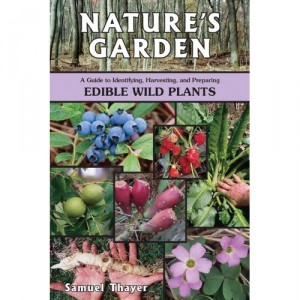
These are not good times to put out a book on edible wild plants. Unless you’re Samuel Thayer.
When I reviewed Thayer’s first book, The Foragers Harvest, I wrote that it is as good or better than anything available on the topic. It has since become the go-to book for students at the Jack Mountain Bushcraft School. His new book, Nature’s Garden, builds upon the high standard set by The Foragers Harvest and establishes him as the leading authority and author on edible wild plants that has ever published. It isn’t slightly better than other books on the topic; it’s in a whole different league.
The meat of the book is made up of plant accounts. These are in-depth profiles of edible plants, full of photos of how to identify, harvest and use them. The author bases all of his work on personal experience, so there aren’t the usual falsehoods handed down by authors of lesser works. Instead, you get what works, along with anecdotal stories of how the author got to know the individual plants and how he’s used them in the past. His writing style is conversational, and while there is a description for each plant that includes botanical terminology, the author writes it so as to make it accessible to the non-botanist. The numerous photos contribute greatly to aid the neophyte in identifying the individual species. The Harvest And Preparation section for each plant is where the author’s experience really shines. Whereas the Peterson’s Field Guide To Edible Wild Plants will list “starchy root” or similar descriptive term after a plant, Thayer has several pages of highly descriptive how-to information. To use a specific example, most books on edible plants have a sentence or two on acorns. Nature’s Garden has 50 pages.
Anyone who has read The Foragers Harvest would expect the Plant Accounts to be encyclopedic and accessible, full of great photos and useful information. On this point, they deliver. If the book contained just Plant Accounts it would still be a fantastic resource. But there’s more to outdoor living and foraging than how-to, and in the first section of the book the author gives a snapshot into the mind of living with wild foods. With sections on getting started, the ethics of harvesting wild plants, conservation, personal experiences on a wild food diet and a harvest calendar, he provides those new to foraging a great jumping off point. In a section titled Some Thoughts On Wild Food, he offers useful advice such as don’t make a wild plant fit the description in the book (which is a common pitfall), then expounds upon the myth of the instant expert. The last chapter of the section is titled “Poison Plant Fables”, where he discusses the story of Christopher McCandless and how his demise in Alaska, chronicled in the book and movie Into The Wild, didn’t occur as the famous author of his biography would have us believe. He didn’t poison himself by eating the wrong plant. Rather, he starved to death. By pointing out the facts, though, he doesn’t poke fun at McCandless like so many armchair survivalists like to do. Instead, he treats him with respect, saving his derision for the authors and movie producers for not telling the truth. The money quote from this section comes in a section titled “What Lessons About Wilderness Survival And Wild Food Can Be Drawn From The Story Of Chris McCandless?”
In a short term survival situation, food is of minor importance. However, in long term survival or “living off the land”, it is of paramount importance.
Bushcraft continues to evolve for me away from skills and toward personal relationships with the land and people. While I’ve never met Samual Thayer, after reading this first section I feel that we’re kindred spirits.
There isn’t a better book on edible wild plants. Taken together with The Foragers Harvest, it is the last word on the topic in print. I don’t think more can be learned from any book; to go beyond what Thayer has written, you have to be out there actively foraging.
Visit Samuel Thayer’s website: foragersharvest.com/
Check out Nature’s Garden on Amazon.com.








Comments on this entry are closed.
we are kindred spirits.
The most important thing I have learned as an author (at least for myself) is how many of us kindred spirits there are.
we are not competitors, but comrades.
Thanks for the words and for the work you do.